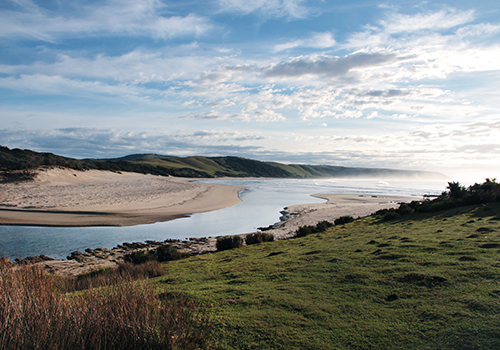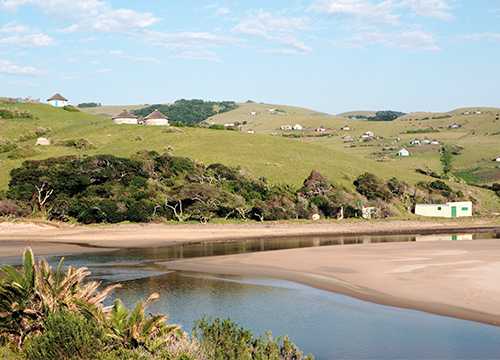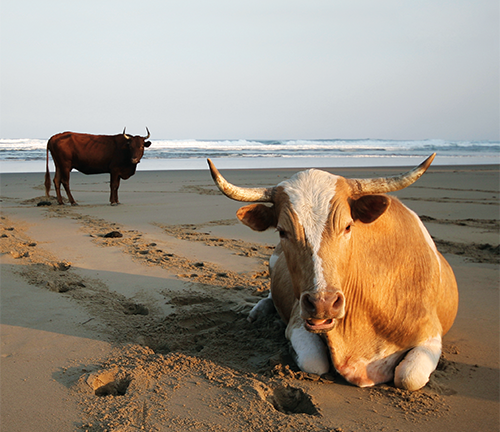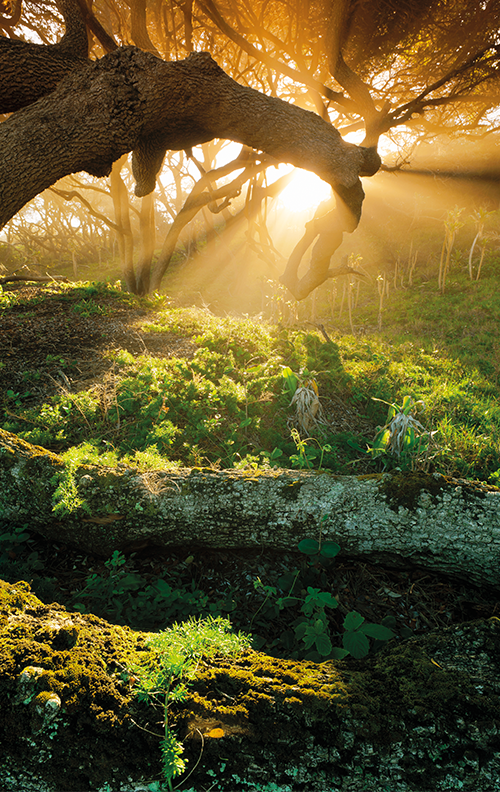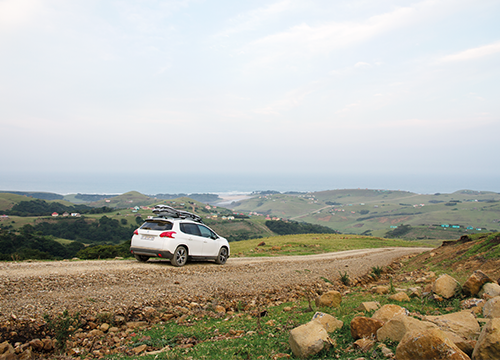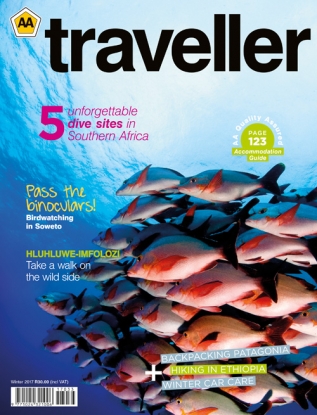Re-energised, through and through. That is how Mark Samuel feels after chilling out at Bulungula eco-lodge, a back-to-nature spot hidden away on the Wild Coast
More than 20 years had passed, and yet nothing had changed. Okay, perhaps this time round there were some locals here and there hunting for that elusive one bar of cellphone signal (mobiles, thankfully, barely existed in SA in the ’90s). But, besides that, I’d stepped back into one of my barefoot childhood holidays on the Wild Coast.
It was still remote, electricity-less (or Eskom-less, at least), gravel-roaded, thatch-hutted and graced with endless unspoilt golden beaches… All so simple, and yet breathtakingly beautiful. And, like my father always did, I was sporting a ragged beard that was to become even shaggier during my stay. Not shaving was an unspoken pact between my dad and his mates during our annual Transkei winter holidays back in the day. Now it was my turn to continue the tradition.
This sliver of Eastern Cape coastline is a region of contrasts. Geographically, it is pure, secluded splendour; socio-economically, it is strikingly poor. So, when I heard a small group of locals were involved in a community-run lodge in the heart of the Wild Coast, I had to check it out for myself.
Bulungula eco-lodge serves two roles. It’s a rustic, unpretentious spot where South Africans and foreigners alike can immerse themselves in the natural beauty and laid-back lifestyle of the region; and it’s a successful small business that gives members of the surrounding community the opportunity to involve themselves in tourism, earning a living and providing for their families. I certainly didn’t need any more reasons to visit.
As if materialising from my memory bank right before my eyes, the roads down to the Wild Coast – at least once you turn off the tar road that heads to Coffee Bay – are, well, wild. They form a convoluted network of gravel routes that meander past vast tracts of open land; clusters of traditional Xhosa huts and kraals; knots of adults and children; and numberless roaming goats, dogs, cattle and stout little black pigs. The scenes that flash past outside the car window represent a way of life that’s changed little over the years.
Calling Bulungula a ‘lodge’ really stretches the definition of the word. Don’t go there expecting chocolates on your pillow at night – it’s nothing like that. It is more of a backpackers, blended with a healthy dollop of local-style hospitality. Accommodation takes the form of permanent tents on timber platforms in the coastal forest (just about overlooking the ocean) or traditional dung-floored and thatch-roofed Xhosa huts (each with a single solar-powered electric light). Alternatively, you can set up your own tent.
Ablutions are rudimentary: indoor compost toilets (which, admittedly, do take a degree of getting used to) basins for tooth brushing, hand washing and face splashing, and possibly one of the highlights of my stay – rocket showers. Your eyebrows are raised, I’m sure. Let’s just say the components include paraffin, matches and toilet paper for ignition, and around seven minutes of hot-water bliss.
Whatever your choice of lodgings once you get there, be sure to keep your luggage light, as this place is so idyllically remote the road doesn’t quite reach it. Upon summiting the last of many, many hills on your journey to the coast, you descend into a valley, from where the smudge of a group of buildings far off in the distance is almost out of sight.
A fenced-off parking area awaits, where a security guard keeps watch for the duration of your stay. Everything there is perfectly safe, I was told. From there, it’s a roughly 700m walk along a grassy track to Bulungula itself, which is tucked away behind the coastal forest, and just up the bank from and overlooking a small tidal estuary. The entire set-up looks northwards along a stretch of golden beach that culminates in towering, grassy hills in the distance, glazed with dark, jagged rocks, against which the fierce ocean crashes day and night, and has done so for millennia. The whole scene is classic Wild Coast – and probably the most fundamental reason anyone should visit.
You can self-cater during your stay, provided your cooler box co-operates. The communal kitchen is open to all guests and you can stow a few perish-ables in the fridges. Alternatively, buy your meals from the lodge; you tick off which ones you’d like and, come breakfast, lunch or dinnertime, you’ll certainly not go hungry. Drinks can be purchased in the same manner – it is effectively an honesty system, with you settling your tab just before you leave. Isn’t that refreshing?
At Bulungula, you can either sign up for one of a multitude of guided activities or head off on your own mission. Our five days there were a blend of relaxed (read: lazy) mornings spent watching the waves crash, coffee and rusks in hand; long beach hikes (our daypacks filled with bananas, peanuts and a couple of liquid refreshments of the hops variety); swimming in the estuary; and a brave bid to surf the enticing waves in the bay. The day hikes were mesmerising – the views of remote landscape and wild sea really are like nowhere else in South Africa (in this case, a promise, not just a turn of phrase).
On the other hand, letting someone else plan your day for your can also be fun. While the people of Nqileni village have 40% ownership in the lodge itself, the small businesses that offer various activities to the guests are all 100% community owned. You can go horse riding, canoeing or fishing, or even try your hand at baking, sewing, wood-carving or cooking traditional dishes. Or, if you’re in the mood for some pampering, two of the local women have been trained as masseuses – the knots in my shoulders really appreciated the treatment! (There’s a small cost involved for each activity you sign up for. I found it was important to ask, as not all of the options and arrangements were clear.)
Bulungula is a clichéd backpackers in many ways – murals painted on the walls, djembe drumming in the evenings and a cosmopolitan mix of accents from guests come dinnertime – but that’s an observation rather than a criticism, as it all fits in so seamlessly in this tucked-away spot and definitely doesn’t feel contrived.
The ‘eco’ in eco-lodge is also authentic. Here, it means using less, impacting less, harnessing the resources naturally supplied to us and re-using – perhaps a notion we all need a little more of in our daily lives.
The Wild Coast is a region every South African should visit (well, more than just visit – explore, adventure in, fall in love with!) But arrive without your ego, without preconceived expectations, and get ready to be nudged out of your comfort zone and into a different, simpler way of living.
Holiday wheels
As if designed with this trip in mind, Peugeot’s new 2008 is a sizeable hatch-cum-SUV blend, with just the right amount of off-road ability. On loan from Peugeot, the spritely petrol derivative got us from Cape Town, through the rough gravel routes of the Wild Coast and back, with ease.
It didn’t complain once, and in fact seemed to come into its own when the tar ended. I simply flicked the dial on the centre console to ‘all-terrain’ and then let the feisty little crossover do the rest. The 1.6l engine is economical (we averaged 7.3 l/100 km over nearly 3 000 km), often covering vast distances at 120 km/h on cruise control.
Our surfboards sat comfortably on a set of Thule racks that attached quickly and conveniently to the 2008’s sturdy roof rails. There is a selection of roof racks in the Thule range, so you’re sure to find the ones perfectly designed to suit your vehicle.
If you’re lucky enough to lead a lifestyle of city driving interspersed with regular adventure, this is the car-roof-rack combo for you.
Peugeot 2008 from R269 900, www.peugeot.co.za
Thule roof racks RRP R3 750, www.thule.co.za
GOOD TO KNOW
When to go
The Wild Coast is a year-round destination. However, it can receive a lot of rain in the middle of summer. Winter is chilly at night, but days can be picture-perfect. Autumn is probably the best time to visit.
Accommodation
At Bulungula, you can stay in the permanent safari tents (which have double beds) or in the Xhosa huts (with a mix of single and/or double beds), or you can camp in your own tent (three-person or smaller, camper vehicles are not permitted).
What to take
Pack relaxed clothing: a couple of T-shirts, shorts, a pair of old jeans, flip-flops, trainers and a swimming costume. No one will care how you dress. Add in a towel and a torch and don’t forget some warm clothes for the evenings and early mornings. Also pack all the medication you may need – there aren’t any shops close by. You can bring your own food and self-cater or enjoy three meals a day supplied by the lodge (prices are very reasonable).
Getting there
Take the Coffee Bay turn-off from the N2, 15 km south (on the East London side) of Mthatha. It’s 50 km on tar, before taking a right turn. Another 16.5 km on tar will lead you to a right turn, where about 35 km of gravel road begins. From there, it’s best to follow the detailed directions on Bulungula’s website. If you drive slowly, you can make the trip in an ordinary 2WD vehicle.
Make contact
To enquire about bookings or for detailed driving directions, get hold of Bulungula directly. Call 047 577 8900 or 083 391 5525, email paradise@bulungula.com or check out their website at www.bulungula.com.
Photography Mark Samuel, Gallo/Gettyimages
(This article was first published in the winter 2014 issue of AA traveller magazine)

